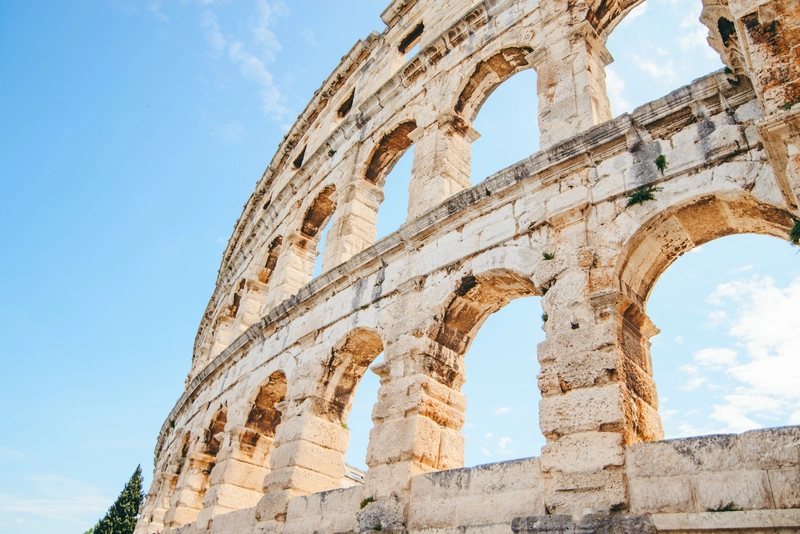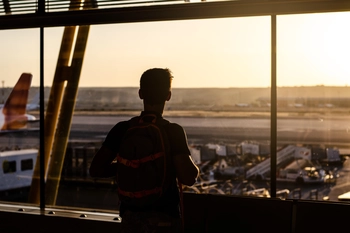Croatia uses the Croatian Kuna (HRK) as its official currency.
Europe / Croatia
Pula: A Guide to Croatia's Coastal Gem
This page contains affiliate links. This means that I get a commission if you purchase through my links, at no cost to you.

Located on the southern tip of the Istrian peninsula in Croatia, Pula is a truly breathtaking city. Its stunning coastline, crystal clear waters, and captivating history make it a popular tourist destination.
When strolling through its streets, you will be mesmerized by the harmonious blend of old and new. Roman ruins coexist with modern cafes and bars creating an atmosphere akin to that of a living museum. Undoubtedly the most impressive landmark in Pula is the Pula Arena—an ancient Roman amphitheater that stands as one of the world's largest and best preserved. Visiting this magnificent structure offers an opportunity to transport yourself back in time, imagining what it was like to witness gladiator fights or theatrical performances over two millennia ago.
But beyond its rich historical significance, what truly sets Pula apart is the warmth and hospitality of its people. Croatians are renowned for their friendliness, but the people of Pula take it to another level. They cherish their city and delight in sharing its treasures with visitors. Wherever you go in Pula you will undoubtedly be greeted with open arms and genuine eagerness to assist. A visit to Pula usually begins with a trip to the bustling farmers market situated at the town center.
Locals and tourists alike flock here to peruse fresh produce and homemade goods on offer. This vibrant market provides an excellent opportunity for interaction with locals while immersing oneself in traditional regional delicacies.
Many visitors choose to delve into Pula's extensive history by exploring sites such as the Roman theater or landmarks like the Temple of Augustus and Arch of Sergius—all remnants of its ancient past. However, it would also be wise to venture into contemporary spaces like art museums or galleries offering insight into Pula's present-day cultural scene. As evening descends, it's time to unwind and enjoy the peacefulness of the sea.
Pula boasts some of the most stunning beaches in the country. These beaches have been honored with the prestigious Blue Flag status, a testament to their cleanliness and quality. No matter what kind of beach experience you prefer whether it's a secluded cove or a vibrant beach bar scene, Pula has it all.
When evening descends over the Adriatic Sea, Pula transforms into a lively hub filled with music, laughter, and clinking glasses. The city's nightlife is truly remarkable; you'll find countless bars, clubs, and restaurants to suit your preferences. Whether you seek a tranquil drink by the harbor or an exciting night out dancing at one of the city's clubs, Pula caters to all tastes.
What sets Pula apart from other destinations is its sense of familial welcome. Croatians have an ingrained sense of community that extends to their visitors. From the moment you step foot in Pula, you are embraced as part of their family. This feeling lingers long after you depart from this enchanting city; it is something that makes Pula genuinely special.
In summary, Pula offers something for everyone. Whether you're fascinated by history simply adore lounging on pristine beaches or enjoy experiencing vibrant parties until dawn breaks—this incredible city has everything covered. Yet more than just its attractions and experiences available—what truly makes Pula exceptional is being welcomed into a loving family eager to showcase their beloved home. In a world where we often feel disconnected from one another—Pula serves as a reminder that there remains a place where hospitality and community hold utmost importance.
Frequently Asked Questions about Croatia
- What currency does Croatia use?
- Are credit cards accepted in Croatia?
Yes, credit cards are widely accepted in Croatia, especially in tourist areas. Visa and MasterCard are commonly used, and you can find card payment options in many establishments.
- What is the best time to travel to Croatia?
The best time to visit Croatia is during the summer months (June to August) when the weather is warm and ideal for enjoying the stunning coastline and islands. The shoulder seasons of late spring (May) and early autumn (September) also offer pleasant weather and fewer crowds.
- What is the population of Croatia?
The population of Croatia is around 4 million people.
- What language do they speak in Croatia?
The official language of Croatia is Croatian. English is also widely spoken and understood, especially in tourist areas and among younger generations.
- Do I need a visa for Croatia?
Visa requirements can vary based on your nationality and the purpose of your visit. Citizens of many countries, including EU and Schengen Area countries, do not need a visa for short stays (up to 90 days) in Croatia. However, it's essential to check the latest visa requirements and regulations based on your specific situation before you travel.
- Is Croatia a safe country?
Croatia is generally considered a safe country to visit. Crime rates are relatively low, and the country has become a popular tourist destination. As with any travel, it's recommended to exercise basic precautions.

